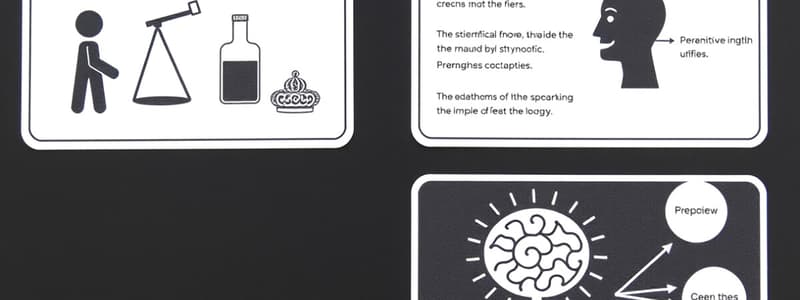Podcast
Questions and Answers
What is the definition of Psychology?
What is the definition of Psychology?
- The scientific study of the mind and behavior (correct)
- Information obtained through the senses
- A systematic approach used in scientific study
- A proposed explanation for an observation
What is the Scientific Method?
What is the Scientific Method?
A systematic approach used in scientific study
What is Observation in psychology?
What is Observation in psychology?
Information obtained through the senses
What is a Hypothesis?
What is a Hypothesis?
What is an Experiment in psychology?
What is an Experiment in psychology?
What is a Theory?
What is a Theory?
What is a Scientific Law?
What is a Scientific Law?
What does Empirical mean?
What does Empirical mean?
What is the Empirical Method?
What is the Empirical Method?
Who is Wilhelm Wundt?
Who is Wilhelm Wundt?
What was Wundt's goal of psychology?
What was Wundt's goal of psychology?
What is Introspection?
What is Introspection?
What is Voluntarism?
What is Voluntarism?
What is Structuralism?
What is Structuralism?
Who is William James?
Who is William James?
What was James' goal of psychology?
What was James' goal of psychology?
What is Functionalism?
What is Functionalism?
Who is Sigmund Freud?
Who is Sigmund Freud?
What was Freud's goal of psychology?
What was Freud's goal of psychology?
Who are Max Wertheimer, Kurt Koffka, and Wolfgang Kohler?
Who are Max Wertheimer, Kurt Koffka, and Wolfgang Kohler?
What is the Gestalt goal of psychology?
What is the Gestalt goal of psychology?
What is Gestalt Psychology?
What is Gestalt Psychology?
Who is Ivan Pavlov?
Who is Ivan Pavlov?
Who is John B. Watson?
Who is John B. Watson?
Who is B.F. Skinner?
Who is B.F. Skinner?
What are the goals of Behaviorism?
What are the goals of Behaviorism?
What is Behaviorism?
What is Behaviorism?
Who is Abraham Maslow?
Who is Abraham Maslow?
Who is Carl Rogers?
Who is Carl Rogers?
What are the goals of Humanism?
What are the goals of Humanism?
What is Humanism?
What is Humanism?
Who is Noam Chomsky?
Who is Noam Chomsky?
What is Biopsychology?
What is Biopsychology?
What is Evolutionary Psychology?
What is Evolutionary Psychology?
What does Sensation and Perception focus on?
What does Sensation and Perception focus on?
What is Cognitive Psychology?
What is Cognitive Psychology?
What is Developmental Psychology?
What is Developmental Psychology?
What is Personality Psychology?
What is Personality Psychology?
What is Social Psychology?
What is Social Psychology?
What is I/O Psychology?
What is I/O Psychology?
What is Health Psychology?
What is Health Psychology?
What is the American Psychological Association (APA)?
What is the American Psychological Association (APA)?
Flashcards
What is psychology?
What is psychology?
Psychology is the scientific study of the mind and behavior, exploring how people think, feel, and act.
What is the scientific method?
What is the scientific method?
The scientific method is a systematic approach used in psychology to collect and analyze data, involving observation, hypothesis testing, experimentation, and theory development.
What is observation in psychology?
What is observation in psychology?
Information gathered through the senses, forming the foundation for empirical research.
What is a hypothesis?
What is a hypothesis?
Signup and view all the flashcards
What is an experiment?
What is an experiment?
Signup and view all the flashcards
What is a scientific theory?
What is a scientific theory?
Signup and view all the flashcards
What is a scientific law?
What is a scientific law?
Signup and view all the flashcards
What does empirical mean?
What does empirical mean?
Signup and view all the flashcards
What is the empirical method?
What is the empirical method?
Signup and view all the flashcards
Who is Wilhelm Wundt?
Who is Wilhelm Wundt?
Signup and view all the flashcards
Who is William James?
Who is William James?
Signup and view all the flashcards
Who is Sigmund Freud?
Who is Sigmund Freud?
Signup and view all the flashcards
Who are Wertheimer, Koffka, and Kohler?
Who are Wertheimer, Koffka, and Kohler?
Signup and view all the flashcards
What is structuralism in psychology?
What is structuralism in psychology?
Signup and view all the flashcards
What is functionalism in psychology?
What is functionalism in psychology?
Signup and view all the flashcards
What is Gestalt psychology?
What is Gestalt psychology?
Signup and view all the flashcards
What is behaviorism in psychology?
What is behaviorism in psychology?
Signup and view all the flashcards
What is humanism in psychology?
What is humanism in psychology?
Signup and view all the flashcards
What is biopsychology?
What is biopsychology?
Signup and view all the flashcards
What is evolutionary psychology?
What is evolutionary psychology?
Signup and view all the flashcards
What is cognitive psychology?
What is cognitive psychology?
Signup and view all the flashcards
What is developmental psychology?
What is developmental psychology?
Signup and view all the flashcards
What is personality psychology?
What is personality psychology?
Signup and view all the flashcards
What is social psychology?
What is social psychology?
Signup and view all the flashcards
What is industrial/organizational psychology (I/O)?
What is industrial/organizational psychology (I/O)?
Signup and view all the flashcards
What is health psychology?
What is health psychology?
Signup and view all the flashcards
What is the American Psychological Association (APA)?
What is the American Psychological Association (APA)?
Signup and view all the flashcards
Study Notes
Introduction to Psychology
- Psychology is the scientific study of the mind and behavior.
- The field utilizes the scientific method, a systematic approach for investigation and research.
Key Terms and Concepts
- Observation: Information acquired through the senses, forming the basis for empirical research.
- Hypothesis: A proposed explanation for a specific observation, testable through experiments.
- Experiment: A method used to verify or falsify a hypothesis.
- Theory: A well-substantiated explanation arising from extensive testing and validation of hypotheses.
- Scientific Law: A concise statement explaining a broad range of natural phenomena, often expressed mathematically.
- Empirical: Relating to knowledge derived from observation and experimentation.
- Empirical Method: Knowledge acquisition based on experiments and observations rather than prior authority.
Historical Figures in Psychology
- Wilhelm Wundt (1832-1920): Considered the founder of psychology as a scientific discipline and introduced structuralism.
- William James (1842-1910): First American psychologist who focused on the whole mind rather than isolated components, introducing functionalism.
- Sigmund Freud (1856-1939): Founded psychoanalysis, emphasizing the unconscious mind and early childhood experiences.
- Max Wertheimer, Kurt Koffka, Wolfgang Kohler: German psychologists who advanced Gestalt principles, focusing on how parts relate to the whole.
Psychological Schools of Thought
- Structuralism: Aims to identify the components of mental processes rather than their functions.
- Functionalism: Studies how mental processes help individuals adapt to their environments.
- Gestalt Psychology: Emphasizes understanding how components of experiences relate to form a cohesive perception.
- Behaviorism: Concentrates on observable behaviors and the effects of consequences on learning; key figures include Ivan Pavlov, John B. Watson, and B.F. Skinner.
- Humanism: Focuses on individual potential and empathizes a positive view of human nature; major contributors include Abraham Maslow and Carl Rogers.
Psychological Specialties
- Biopsychology: Examines the interplay of biological processes, behavior, and mental functions.
- Evolutionary Psychology: Investigates biological underpinnings of behavior and mental processes.
- Cognitive Psychology: Studies mental processes like perception, memory, and problem-solving.
- Developmental Psychology: Observes psychological growth across the lifespan.
- Personality Psychology: Analyzes the development of individual thoughts and behaviors.
- Social Psychology: Explores interactions and relationships among individuals.
- Industrial/Organizational Psychology (I/O): Applies psychological theories to workplace issues.
- Health Psychology: Examines how psychological factors affect physical health.
Professional Organizations
- American Psychological Association (APA): Founded in 1892, represents psychologists in the U.S., promoting research and practice in psychology.
Studying That Suits You
Use AI to generate personalized quizzes and flashcards to suit your learning preferences.




